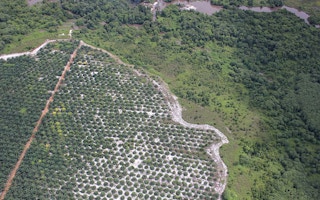The Indonesian Ministry of Environment and Forestry is going to court over a successful freedom of information request by Greenpeace, setting the stage for a protracted legal battle over a form of data NGOs say they need if they are to play a monitoring role in the world’s third-largest democracy.
Greenpeace Indonesia on Oct. 24 won its yearlong suit submitted to the Central Information Commission (KIP) against the ministry demanding access to seven different geospatial maps of Indonesia, including those showing oil palm, timber, and mining concessions as well as the archipelago country’s land cover.
The group argued its case under the 2008 Freedom of Public Information Law, which established the KIP. “This is exciting news for us,” Greenpeace’s Kiki Taufik said immediately after the ruling came down. “The commission has made the right decision.”
Last month, though, the forestry ministry appealed the decision to the Jakarta State Administrative Court, chiefly arguing that compliance would violate the 2011 Geospatial Information Law.
The case hinges on Greenpeace’s request for the data in shapefile format. The NGO says it used to be able to obtain shapefiles from the ministry simply by asking. Since 2013, however, the ministry has only provided access to .jpeg and .pdf forms of the data, arguing that the geospatial law forbids the release of shapefiles.
Shapefile format (.shp) is a widely preferred version for analyzing geographic information as it enables overlaying different maps with higher accuracy and legitimacy due to its digital signatures feature.
“
This is exciting news for us. The commission has made the right decision.
Kiki Taufik, Greenpeace Indonesia
Using geospatial data in .jpeg or .pdf format requires manual digitalisation which poses more chances of deviation. On a mapping scale of 1 : 250,000, a mishap of 1 millimeter during the digitalisation process results in a deviation of 250 meters in the field.
That can make monitoring the activities of extractive companies and agribusinesses highly challenging for watchdogs like Greenpeace.
The geospatial law, indeed, stipulates that the government can only release officially legitimate geospatial information to prevent risks of data misuse or alteration. The sanction for officials who inappropriately release data is a maximum of two years behind bars and fine of up to 500 million rupiah ($37,400).
Should the violation pose a danger to a person or thing, the suspect faces three years prison time and fine of 700 million rupiah.
In addition to that regulation, the forestry ministry also issued in 2014 a memo exempting the publication of shapefile data by its various departments.
“The consequence for [breaking] the law is imprisonment. [Besides], there isn’t a technology yet that can legitimise these shapefile maps,” Novrizal Tahar, who was then a spokesperson for the ministry, was quoted as saying in October by the daily Kompas.
The ministry, which did not respond to Mongabay’s request for comment, is not the only one to express concerns about the consequences of shapefiles made public. One of the four judges in Greenpeace’s KIP case had a dissenting opinion, pointing out that shapefiles are vulnerable to alteration because they lack the capacity to be legally legitimised.
This story was published with permission from Mongabay.com. Read the full story.










